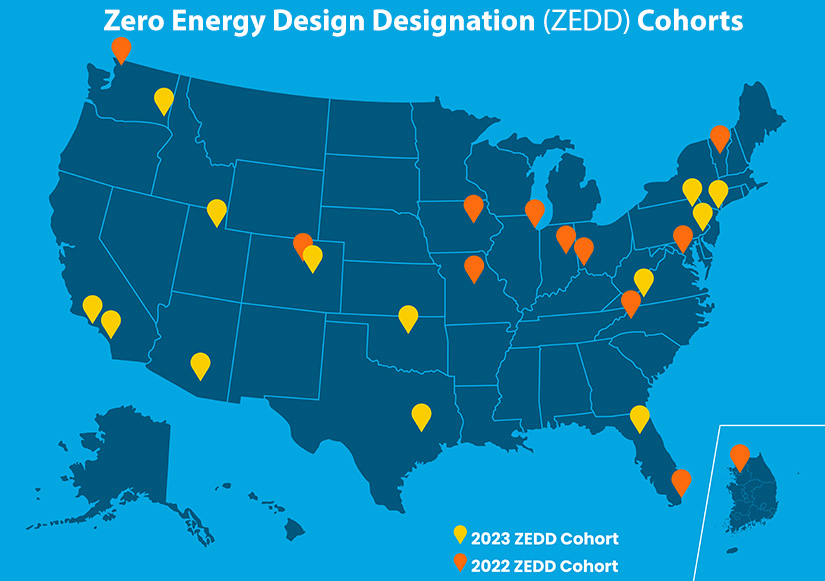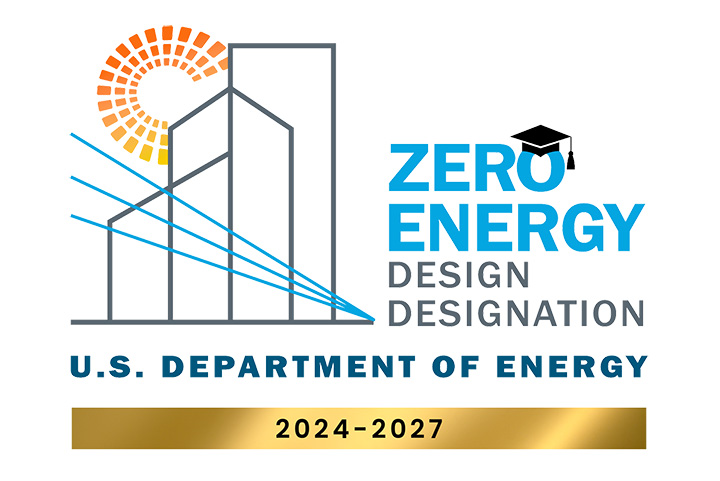Zero Energy Design Designation Sets Collegiate Building Science Programs Apart
Apply by June 28, 2024, To Have Your Program Recognized by US Department of Energy

Set your zero-energy collegiate program apart with a designation from the U.S. Department of Energy (DOE)!
DOE's Zero Energy Design Designation (ZEDD) is open for applications for the 2024–2027 designation period until June 28, 2024, at 11:59 p.m. PDT. The next chance to apply will not open until 2025.
ZEDD distinguishes programs of study that teach best practices of zero-energy design and require students to apply those concepts in zero-energy design projects. The designation lasts for three years, after which programs may apply to renew. Since launching in 2022, the ZEDD program has recognized 39 programs of study from 26 institutions.
"These schools have excelled at preparing tomorrow's leaders to design, construct and operate the most sustainable, high-performing buildings possible," said Jaime Van Mourik, ZEDD lead at DOE.
"I don't know of any other designations like it," said Georg Reichard, professor and head of the department of building construction at Virginia Tech. "It is really laudable that DOE has stepped into this vacuum and is recognizing programs of study to fill the void of a topic area that is really not covered in any accreditations."
Collegiate institutions can earn the designation for a single program of study or for an entire degree program, as Marywood University has done for its bachelor of architecture program.
"We wanted to designate our whole degree, not just one track, so that all of our students benefited from additional building science education," said Jodi La Coe, associate professor of architecture at Marywood University.
Hands-On Practicums

There is flexibility in terms of the practicum required for ZEDD—students could compete in the U.S. Department of Energy Solar Decathlon® or complete a practicum designed by the school.
"Students get a sense of urgency and criticality by being exposed to a real project, where the rubber meets the air seal, so to speak," Reichard said. "Air tightness and moisture damage pose the biggest threat to buildings, and these things aren't required to be taught for many accreditations. It really rings home when students get into enclosure design in hands-on projects."
There are also free resources for schools that have not led a hands-on practicum before or who do not have an established building science curriculum.
"This designation gives so many resources to get up to speed quickly, especially the Solar Decathlon Building Science Education videos," La Coe said. "You can assign them as homework, incorporate them into class, even use them yourself if you are teaching a new course."
One way to meet the ZEDD practicum requirement is to participate in the Solar Decathlon Design Challenge, a yearly collegiate competition that challenges students to design sustainable, zero-energy buildings powered by renewables. The next Solar Decathlon registration period will open in August 2024 and close in October, with competition deliverables due during the spring 2025 semester.
Does My Program Qualify?
Examples of programs that have received the designation include architecture, architectural engineering, mechanical engineering, sustainable building design, zero-energy design, and more. A wide range of programs are eligible to apply, including stand-alone degrees, specialty tracks, and certificates.
Past designees have included U.S. and international universities, colleges, and community colleges who focus on zero-energy building science.
"Examine your own curriculum—you may already be doing it, or ZEDD may allow you to add it in a structured way with support from DOE resources, colleagues, sharing curriculums, etc.," Reichard said.
"I would recommend pursing the Zero Energy Design Designation for the conversations it opens up with colleagues, how to orient the curriculum to solving our climate crisis problems, and for training the next generation to think differently about our resources," said La Coe, who has three programs recognized.
After DOE reviews application materials, programs that meet the ZEDD requirements will be announced in September and will receive national promotion. Review the application checklist and informational webinar to apply by June 28.
"If you are already highlighting building science in your curriculum," La Coe said, "this designation gives you the recognition you deserve."
Last Updated May 28, 2025
